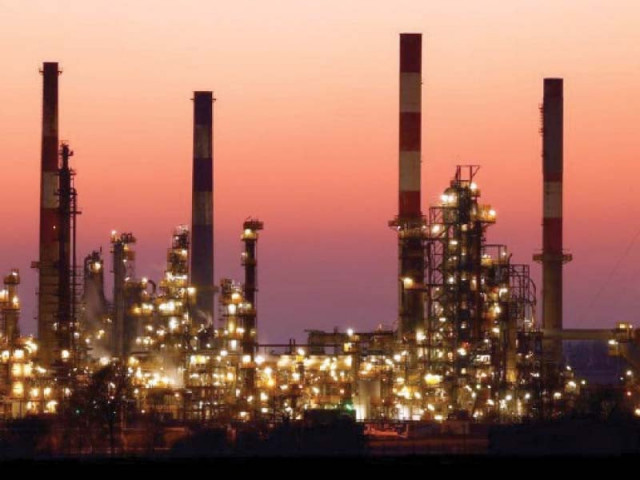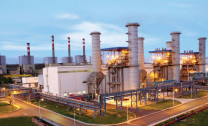Underutilising country’s resources
Refineries suffer from low capacity utilisation mainly due to weak furnace oil demand

Pakistan has been blessed with abundant resources but due to one reason or the other, the country could not efficiently utilise them to achieve sustainable growth and economic prosperity.
The oil refining industry is a prime example of how a resource that could play a critical role in the country’s economy has been underused. However, the newly formed government now has an opportunity to fix this problem. By reviving the oil refining industry, the country’s petrol and diesel production can be increased significantly.
This can be done fairly quickly, given the groundwork has already been laid.
There are five oil refineries in Pakistan that can produce enough petroleum products, like petrol and diesel, to meet a vast majority of demand.
The country’s total refining capacity stands at 19.37 million tonnes per year, according to data from the Economic Survey of Pakistan.
Meanwhile, sales of petroleum products by the oil marketing companies (OMCs), taken as a proxy for consumption, came in at 16.26 million tonnes in the first nine months of current financial year, reports of leading brokerage houses show. On an annualised basis, this translates into 21.68 million tonnes of annual consumption.
Unfortunately, the refineries have been running well below their respective capacities. They produced 7.62 million tonnes of petroleum products in the first eight months of current financial year, as per the latest report of the Oil Companies Advisory Council (OCAC).
From this, we can calculate that the refinery utilisation was 59%. In other words, around 41% of Pakistan’s oil refining capacity remained idle during the greater part of the fiscal year.
This low utilisation rate is largely in line with what we’ve seen in previous years. As a result, Pakistan continues to suffer from low levels of domestic production of refined petroleum products and has to buy expensive fuels like petrol and diesel from abroad to fulfill the country’s requirements.
These imports have hurt the economy by playing a big role in pushing the trade deficit up by an alarming 71% during the Jul-Mar period of FY22 to $35.52 billion, according to the Pakistan Bureau of Statistics (PBS) data.
The low utilisation can be attributed mainly to the weak levels of furnace oil consumption.
When an oil refinery processes crude oil, it produces different kinds of petroleum products. In Pakistan, the hydro-skimming refineries primarily produce diesel, petrol and furnace oil.
But over the years the consumption of furnace oil has fallen after power companies (IPPs) shifted their feedstock from furnace oil to liquefied natural gas (LNG).
Consequently, the furnace oil stocks held by refineries started to build up, and to manage inventory levels, they had no other option but to curtail plant operations.
However, with the global LNG market witnessing high prices and short supplies, the share of furnace oil in power generation has increased this year.
Total furnace oil sales from OMCs rose by 16% in the first nine months of current financial year. But this growth hasn’t been enough to aid oil refineries that continue to struggle with low utilisation rates.
Oil refineries have been continuously operating only partially when, during a period of lofty oil prices, even higher refined product prices in the international market, and supply issues due to geopolitical tensions, they should be operating at maximum capacity to cut down the country’s dependence on foreign fuels.
This is one problem that the new government should consider resolving at the earliest, perhaps by running the project of reviving oil refineries at “Shehbaz speed”.
In the short term, the refinery utilisation can be increased dramatically if the government allocates a small portion of the country’s power generation for furnace oil consumption.
At present, power plants in Pakistan can produce 23,500 megawatts of electricity (dependable capacity, excluding hydel and nuclear generation). Of this, if just 1,700MW is assigned to furnace oil, then these plants will consume virtually all of the fuel produced by the domestic refineries.
The issue of low lifting of furnace oil will get resolved and refineries should be able to increase capacity utilisation to as high as 100%.
The big jump in utilisation will cause an increase in domestic petrol, diesel, and jet fuel production. This will reduce the need to import fuels, save forex reserves, and strengthen the country’s energy supply chain while making it resilient to the external commodity price shocks.
On top of this, it will make the country less vulnerable to the skyrocketing prices and cargo cancellations in the international LNG space.
That said, it is also important to recognise that oil refineries need to upgrade to modern standards to comply with energy dynamics of the low-carbon age.
In the long term, the production of furnace oil needs to be phased out in favour of cleaner burning alternatives while the quality of petrol and diesel production should be improved to make them more environmentally friendly.
To do this, the government must push oil refiners to upgrade their plants. Incentives should also be given to the industry to encourage them to do capital-intensive work.
The good thing is that an oil refinery policy, which is expected to usher in an era of modernisation, has reportedly been in the final stages of development.
The PTI government spent the last couple of years building this policy but due to the lack of political will or other factors, it remained in limbo. But the PML-N government should work on introducing the policy without unnecessary delay and ensure the refining industry begins the much-needed upgrading work.
The writer focuses on subjects of business and economics, specialising in the energy sector
Published in The Express Tribune, May 9th, 2022.
Like Business on Facebook, follow @TribuneBiz on Twitter to stay informed and join in the conversation.


















COMMENTS
Comments are moderated and generally will be posted if they are on-topic and not abusive.
For more information, please see our Comments FAQ